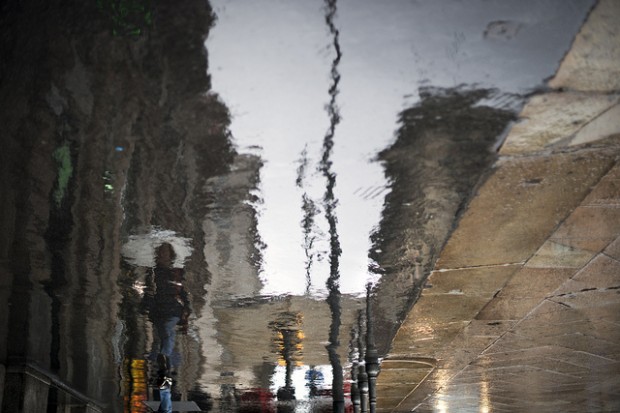You have no items in your cart. Want to get some nice things?
Go shopping
What I was thinking that day was how rain reveals the uneven city. Every day, we approximate what we see around us into a map in our brain; an isometric Lego-brick construction where every kerb is a right angle, every building face perfectly smooth, every street laid with a spirit level.
Then the rain comes, uniform grey, sheeting down at the same angle on rich and poor, and it shows us the flaws in what we imagined was a smooth machine. Widening puddles show us that there was no spirit level. Impromptu waterfalls slough off of—as we thought—level roofs. Drip-drip-drip, in one place and not another, showing us how everything is not the same.
That’s what I was thinking, when I saw him. Standing there, smoking on the porch while my big lady made dinner and my little lady watched TV. Standing there, like me, watching the rain pour down and wash away the city’s level perception of itself, getting into the cracks.
I sometimes put myself back in that moment, eke it out as long as I can. Play with the prospect of turning away, going back into the warm, into the dry. Settling in to watch TV or help with the cooking. Taking the next step on a nice, ordinary path, savouring coffee-and-bagel mornings, one after another, stretching out before me in simple bliss.
But that’s not what I did. I looked across, and he was there, under the porch across the street; the old rat-trap Mason’s place, looking perfectly in place, mouldering in an moth-eaten trench-coat, pulling its collar high around his face, to keep out the cold and hide his pock-marked skin.
His eyes locked onto mine; he’d been waiting for me, waiting for me to see him, and I did. I saw how clever he was, that junkie cunning. Like garbage-matted cats that swarm and multiply, there’s never as much intelligence in our actions as when we’re on a mission.
My best hope had been like they said in the meetings, to abstain for a day, and then the next, and then the next. A lifetime of coin tosses, all coming up heads. But I looked at him then, through the rain, and I knew today I’d come up tails.
His cleverness was in not coming to the door. Knocking on the door, or coming right up as I stood there, he would’ve been on my ground. I would’ve bristled. My two ladies would’ve been just two steps away, the door easy to retreat behind. He would’ve been initiating things, coming to me, beseeching. I could’ve held out, held strong. I could’ve said: I can’t. I could’ve said: I’ve my shit together now. We could, at any moment, have been interrupted. He couldn’t have stood up to my little lady’s innocence. And my big lady would’ve needed no introductions, would’ve known straightaway what part of my life he came from, and seen him off with a stare.
But standing there, across the street, he’d asked nothing of me, threatened nothing. Turning away, closing the door, would’ve said: All that never happened. It would’ve said: We never ran those streets together. It would’ve been turning my back not just on what he needed and wanted now, but on everything he ever was to me. Unless I could stomach that, I had to go over. And that changed everything.
Going over was colluding. Collaborating. There was such power in those steps. I was coming to him. I was already leaving my new life behind. In my head, I’d just go over, say hi, ask him how he was doing, maybe give him a couple of notes to help him out, and then stroll back into my life, only a little damper for the trip. But it would always be easier not mention it when I went back inside. Too much hassle, too many bad memories. From the porch, I could tell it that, innocent, I’d repelled him. From across the street, sharing a cigarette, crouching away from the rain and hiding my face from my windows in case my family looked out… it was just easier not to say a word, and so began the collaboration, just like old days of stripping boiler-copper and chasing highs.
Nothing happened then, not really. We just shared a cigarette. I gave him enough for a hit. But we both knew he’d be back, and that sooner or later I’d be far and long enough away with him to say: Okay, just this one time for old times. I spun some other yarn to myself around it, of course—I don’t even remember what it was now—but the part of me that wanted that day more than anything else was lining up its ducks, the whole time, getting them all in a row.
The rest of the story is as depressing as it is inevitable. Secrets, lies, recriminations, tears. My two ladies are with grandma now, and better off, and I’m somewhere where I wouldn’t be writing this if I could sell this paper, or if pen-middles were as useful as pen-outers.
But I only have to close my eyes, and I’m there. The rain comes down, and shows me the gaps in everything, and I stand in that moment of decision, that moment that I like to think could’ve gone either way. I stretch that moment out, when I remember it. But the truth is, it was shorter than I like to admit.

About Terry Paul Pearce
Terry Paul Pearce lives in London. He has written for Monkeybicycle, Underground Voices, Cezanne's Carrot, Grey Sparrow Press and Right Hand Pointing. His blog, at One Monkey, One Typewriter, contains links to all his published work.




